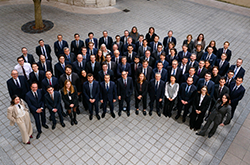A web conference on responsible investment
On March 24, Indosuez Wealth Management experts led a web conference which was devoted to responsible investment.
Virginie BOURGEOIS, Head of Sustainable Development and the Societal Project, Zoé ORMIÈRES-SELVES, Portfolio Manager, Specialist in ESG themes at Indosuez Gestion and Nicolas MOUGEOT, Head of Global Trends and ESG Advisory at Indosuez Switzerland addressed the main questions that we all have on this current topic with pedagogy and supporting examples and illustrations. Here are the key points...
At the centre of a dedicated ecosystem
Responsible investment is part of Crédit Agricole group's DNA and lies at the centre of its raison d'être. The Group’s governance, decentralised organisation, commitment for more than 20 years, in addition to the unique position of CACIB, a leader in green finance, and Amundi, an SRI pioneer, are just a few examples of the specific ecosystem developed within Crédit Agricole.
Indosuez is also a quite committed entity. "Responsible finance is at the centre of our corporate project, with a strong ambition to create a specific offer and to include ESG (environmental, social and governance) criteria in our asset management and product selection decisions," stated Pierre MASCLET, Group Deputy CEO, in his introduction. We have already achieved a great deal, such as raising awareness and educating clients, not to mention the day-to-day commitment of our employees to the Indosuez Foundations in France and Switzerland or during Citizen Days in Luxembourg and Monaco, for example.
Our commitments can now be seen in the comprehensive and innovative offer that is deployed in all asset classes in close collaboration with Amundi for funds or CACIB for green structured products, but also through the forthcoming integration of ESG ratings in client portfolios.
A few defining elements
"The financial industry uses ESG1 criteria to evaluate companies from an extra-financial perspective. The aim is to take into account criteria related to the environment (E), social (S) and fine governance (G). When these criteria and the sub-criteria they cover are integrated into the investment management approach, we speak of socially responsible investment," explained Virginie BOURGEOIS before getting to the heart of the matter.
The objective of SRI is to reconcile a company’s social and environmental impact with its economic performance, to finance players who contribute to sustainable development, and to foster a responsible economy by influencing the governance and behaviour of these players.
An urgent need to act
Over the past year, investors and political decision-makers have become increasingly aware of the urgency of climate change, and $1,000 billion public funding has been earmarked for energy transition projects across the world (developing wind farms, 1.5 million affordable housing units in the United States, 50,000 kilometers of railroads in China, etc.). This figure could be doubled or even tripled if private sector initiatives are taken into account.
"In 2020, investors have also shown awareness of this issue. They have come to realise that it is possible to combine financial performance with ESG criteria and are now encouraging companies to follow suit." Nicolas MOUGEOT commented. For example, ETFs linked to ESG themes have increased by 150% in 2020.
We can now choose an investment based on its ESG criteria analysis, which is complementary to traditional financial analysis and allows us to highlight risk types or analysis areas that are traditionally less taken into account.
"Responsible investment covers several aspects: the integration of ESG criteria into fundamental analysis, SRI management, management of ESG themes and impact investment. These various approaches correspond to different degrees of integration that are not necessarily exclusive." said Zoé ORMIÈRES-SELVES
Among the most promising ESG themes in 2021, we can mention electric vehicles, hydrogen and clean energy, energy efficiency, circular economy and education. "These are long term themes, but they are not immune to the financial markets’ short-term or even cyclical shocks," added Zoé ORMIÈRES-SELVES.
What about the banks’ credibility?
The role of banks is to manage the savings flow and to finance the economy. They therefore have the possibility of directing part of the savings towards companies that have a positive impact on the environment and society through their products.
They can also support companies in their energy transition and guide their clients to appropriate investment choices depending on their sensitivity.
In conclusion, Virginie BOURGEOIS reminded the audience of the key role played by investors in favour of a more sustainable development and a more responsible economy, and of Indosuez's commitment to support them with its offering, which will continue to be expanded to meet their expectations as closely as possible.
[1] The environment covers the impact of the company on climate change, resource depletion, waste management, pollution, etc.
Social criteria correspond to the consideration of human rights, working conditions, access to education, etc.
Governance criteria correspond to the diversity of boards of directors, remuneration policy, tax strategies, etc.
March 26, 2021




